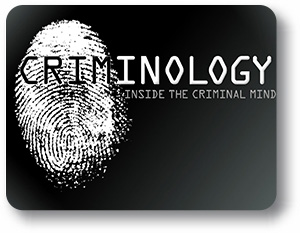Criminology: Inside the Criminal Mind

Course Overview:
In today’s society, crime and deviant behavior are often one of the top concerns of society members. From the nightly news to personal experiences with victimization, crime seems to be all around us. In this course, we will explore the field of criminology or the study of crime. In doing so, we will look at possible explanations for crime from psychological, biological, and sociological standpoints, explore the various types of crime and their consequences for society, and investigate how crime and criminals are handled by the criminal justice system. Why do some individuals commit crimes but others don’t? What aspects in our culture and society promote crime and deviance? Why do individuals receive different punishments for the same crime? What factors shape the criminal case process, from arrest to punishments?
Syllabus:
Unit 1: The World of Criminology In this unit, you will be introduced to the field of criminology. We will discuss what crime is and how it is related to deviance. We will also examine the similarities and differences between criminologists, criminalists, and criminal justice professionals. In addition, we will investigate the idea of criminal intent and the various defenses that might be used when a crime is committed. Finally, we will look at some of the research methods that are used in the field of criminology to help us better understand crime and criminals. What will you learn in this unit?- Learn what crime is and how it is related to deviance.
- Discuss what criminology is and how it relates to other disciplines.
- Investigate legitimate reasons why a crime might be excused.
- Examine crime statistic sources and the issues with each.
- Look at some of the research methods that criminologists use to study crime.
- Learn about early biological explanations of crime such as phrenology.
- Discuss chemical and hormonal theories of crime.
- Look at psychoanalytic theories of crime.
- Examine modeling and self-control theories.
- Investigate the legal definitions of insanity and how psychological profiling is used to solve crimes.
- Learn what social structure and social conditions are and how they relate to crime.
- Examine how social transition and rapid change can result in crime.
- Discuss how individuals may adapt to cultural goals in a way that leads to crime.
- Investigate how physical conditions affect crimes.
- Discuss the roles that inequality and power have in crime.
- Learn about crimes against persons and crimes against property.
- Understand the different legal categories of homicide.
- Examine the different categories of thieves.
- Investigate the cost of crimes like larceny.
- Discuss the social conditions that factor into crimes such as burglary.
- Identify the differences between occupational and corporate crimes.
- Discuss the costs of white-collar and corporate crimes to society.
- Examine different types of corporate crimes.
- Discuss possible solutions for controlling organized crime.
- Investigate the controversies over public order crimes and their enforcement.
- Learn about the criminal justice system and what is included in the system.
- Discuss how the criminal justice system had its beginnings.
- Examine the goals of the criminal justice system.
- Investigate the various stages of the criminal case process.
- Look at how the juvenile criminal case process differs from the adult criminal case process.
- Learn about the conflicting models toward crime and criminals in the criminal justice system.
- Discuss the factors that influence law enforcement decisions.
- Understand the U.S. court system, including state and federal courts.
- Examine what occurs in a typical criminal trial.
- Investigate the reasons for and against the death penalty and what research has shown about the death penalty.
- Understand the different facilities used to hold and incarcerate offenders.
- Learn about the history of the correctional system.
- Examine the cost of correctional institutions to society.
- Discuss probation and why it is used.
- Examine alternative sanctions, such as house arrest and community service.


